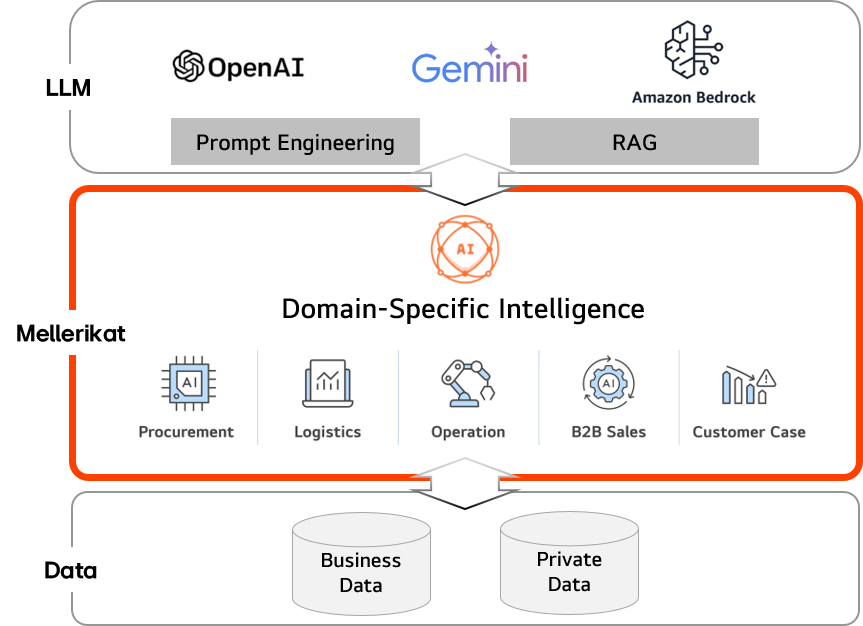Gen AI and Domain-Specific AI
Specialized Intelligence: The Key to Business Innovation Beyond General Intelligence
Since the digital revolution, artificial intelligence (AI) has rapidly advanced, bringing transformative changes to our daily lives and industries. The emergence of Generative AI (Gen AI) has made AI technology accessible to everyone, but it has also introduced various challenges. While a universal AI capable of excelling in all domains is an ideal goal, in reality, specialized intelligence tailored to specific fields often delivers greater value.
Generative AI exhibits characteristics close to General Intelligence (AGI), enabling it to perform a wide range of tasks. This Gen AI capability contrasts with AI technologies specialized for specific problems, offering versatility across diverse contexts and scenarios.
In the field of AI, Artificial General Intelligence (AGI) is progressing at an impressive pace. While this development is remarkable, pursuing the highest level of general intelligence can sometimes seem overly ambitious and impractical. Instead, true value lies in developing and leveraging domain-specific intelligence to address challenges within particular fields, embodying specialized expertise and capabilities tailored to specific tasks and contexts.
Specialized intelligence technologies provide optimized models for specific industries and use cases, enabling enterprises to effectively tackle complex challenges. Unlike general AI, specialized intelligence deeply understands the unique data and patterns of a specific domain, delivering superior results. Over time, this approach enables higher-quality predictions and analyses, maximizing business value. Mellerikat supports the seamless development and operation of such specialized intelligence, empowering enterprises to effectively leverage expert knowledge.
Large Language Models (LLMs) can collect and summarize diverse business-related news data to provide information on specific topics. However, predicting whether copper prices will rise or fall exceeds the capabilities of LLMs. This task requires domain-specific intelligence, such as a predictive machine learning (ML) engine integrated with the expertise of copper pricing specialists.
The Role and Advantages of Domain-Specific AI Engines
Integration of Expert Knowledge
- Tailored Solution Development and Incorporation of Accumulated Experience: Developing domain-specific intelligence requires specialized expertise and modeling experience. Mellerikat provides AI Contents and the ALO Framework to seamlessly integrate this knowledge into AI engines, enabling enterprises to leverage AI solutions optimized for their specific business models.
Enhanced Data Security and Privacy
- Selective Data Collection: By processing data through specialized intelligence before sending it to generative AI, the risk of sensitive data leaks is minimized, which is critical for protecting enterprise information.
Increased Cost Efficiency
- Cost Reduction: Utilizing filtered data reduces unnecessary computations, lowering costs and enabling efficient use of computing resources.
- Computing Resource Optimization: Optimizes resources to maintain high performance while achieving cost efficiency.
Improved Reliability and Accuracy
- Hallucination Prevention: Specialized intelligence analyzes and validates data, reducing the likelihood of unrealistic responses, which enhances AI system reliability.
- Decision-Making Support: Provides accurate and reliable information to support critical decision-making, minimizing business risks and maximizing outcomes.
Enhancing Expertise Through the Integration of Specialized Intelligence and LLMs
Specialized AI engines leverage domain intelligence analysis results, applying prompt engineering and Relevance Augmented Generation (RAG) techniques to enable LLMs to deliver more professional and efficient responses. Mellerikat facilitates this integration, empowering enterprises to utilize AI technology more effectively.

- Prompt Engineering: Designs sophisticated prompts to deliver key insights analyzed by specialized intelligence to LLMs, enabling the generation of professional responses tailored to specific domains rather than generic answers.
- Relevance Augmented Generation (RAG): Integrates the results of specialized intelligence into the LLM’s learning process, ensuring that generative models produce more accurate and reliable responses.
This approach transcends the limitations of using generative AI solely for search, enabling the creation of valuable responses that directly support business decision-making.
The true power of AI lies not in pursuing general intelligence alone but in the strategic application of specialized intelligence. Mellerikat supports the development and operation of such intelligence, serving as a critical enabler for enterprises to maintain sustainable competitiveness. By combining general and specialized intelligence, AI technology can be leveraged more effectively in business contexts.
